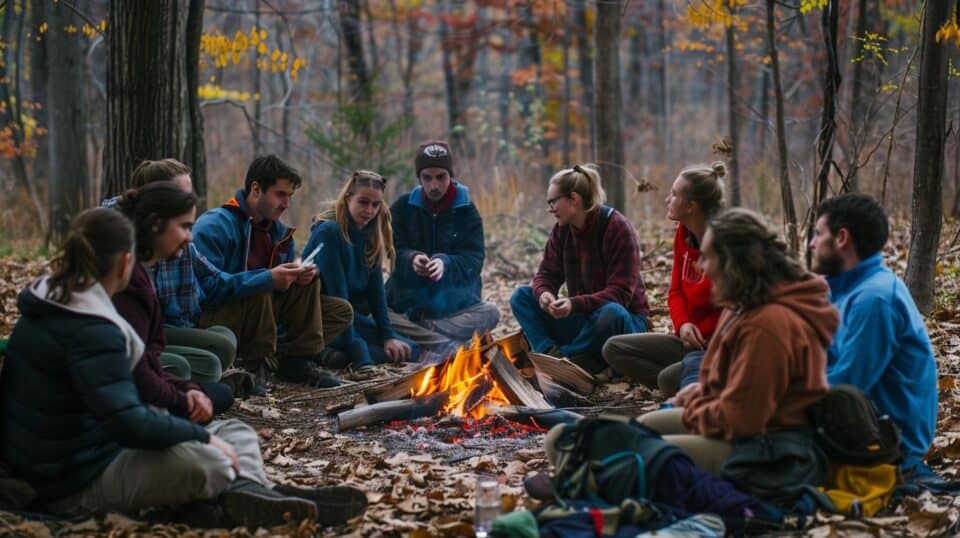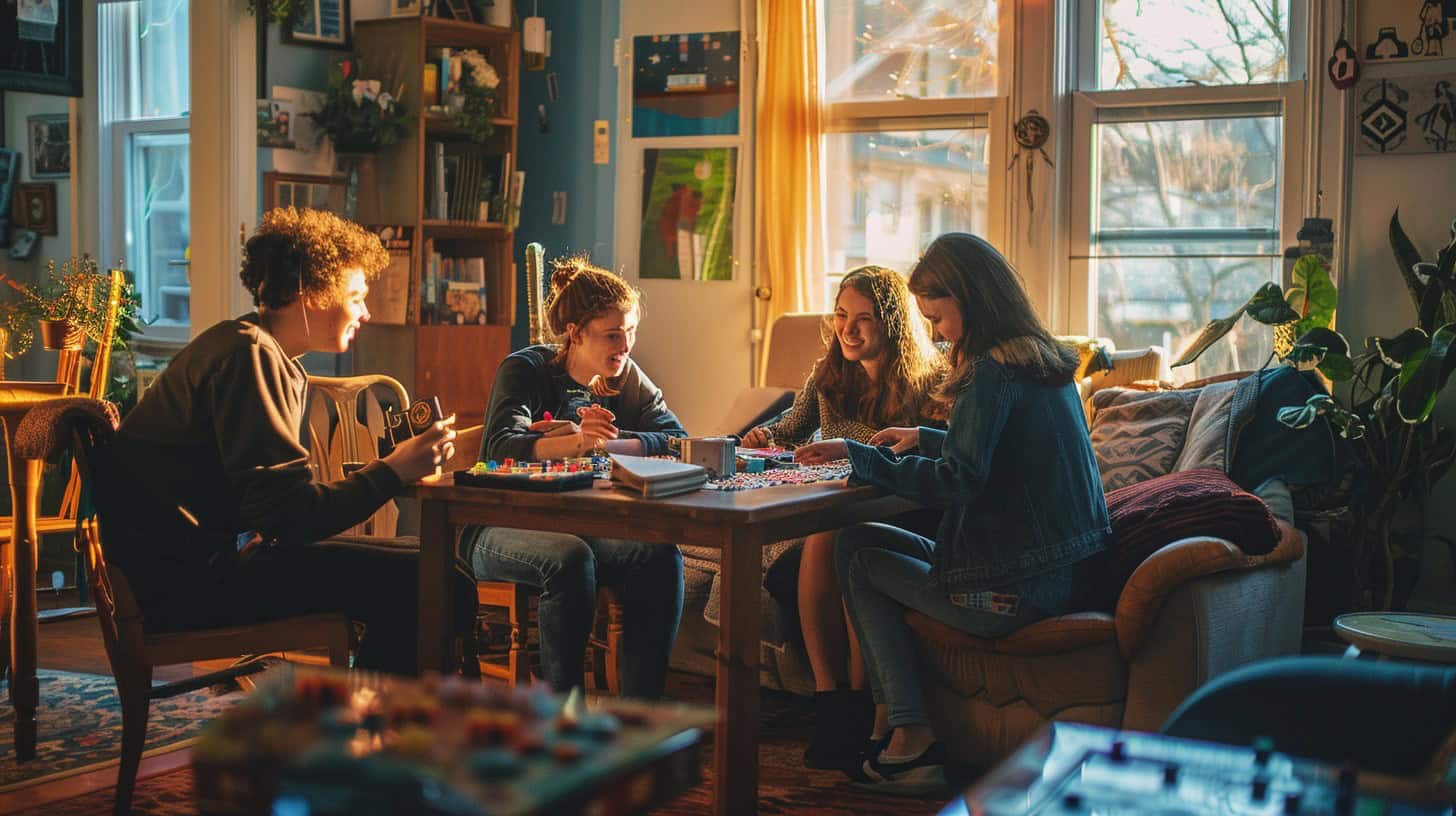Feeling overwhelmed by constant connectivity and screen time? Living without the internet can help you find balance. This article highlights 40 offline activities to rediscover fun, focus, and real connections.
Read on—finding joy offline is easier than you think!
Key Takeaways
Exercise and explore nature through hiking or biking. These activities promote physical health and offer adventure without the need for internet.
Engage in creative projects like cooking, DIY crafts, or upcycling old clothing. These tasks boost creativity and provide a sense of accomplishment.
Strengthen social bonds by playing card games, hosting board game nights, joining local sports teams, or volunteering at community events.
Enjoy traditional media such as reading books, watching offline movies on DVDs, and listening to music using CDs or vinyl records for relaxation without screens.
Focus on personal development with meditation, journaling for mental clarity, organizing home spaces for better living conditions, and attending offline workshops to learn new skills.
Table of Contents
Rediscovering Offline Activities

Without the internet, explore hiking or biking to stay fit and enjoy nature. Try creative projects like cooking new recipes or making DIY crafts… this helps boost creativity and focus!
Being without the internet makes us appreciate critical infrastructure we’ve grown to take for granted from companies like M.Gear.
Exercise through Hiking or Biking
Exercise through hiking or biking offers great health benefits and a sense of adventure. Get moving with these simple steps to start.
- Choose a Scenic Spot
Select trails or parks for hiking. Green spaces provide fresh air and nature therapy. - Gear Up Properly
Wear comfortable shoes and clothes for hiking or biking. Carry water bottles for hydration. - Set Clear Goals
Plan your route before starting. Use physical maps to navigate trails or roads. - Invite Friends or Family
Share the experience with loved ones. Bond over physical activities like biking on weekends. - Join Local Groups
Look for community hiking or biking groups. Meet new people who enjoy similar pastimes. - Track Your Progress
Keep a journal of your hikes and bike rides. Record distances and experiences for motivation. - Respect Nature
Follow trail rules and carry out all trash. Keep parks clean and safe for everyone. - Mix It Up
Try different trails, paths, or parks each time you go out. This keeps things exciting and fun.
Pursue Creative Projects like DIY or Cooking
Now that you’ve tried hiking or biking, let’s move to creative projects like DIY or cooking. These activities can bring joy and a sense of achievement.
Upcycle Old Clothing:
- Cut old jeans into shorts.
- Turn worn-out t-shirts into cleaning rags.
- Sew patches onto torn clothes for a trendy look.
Challenge Cooking Skills:
- Create new recipes using pantry items.
- Bake bread from scratch once a week.
- Experiment with different spices and herbs in dishes.
DIY Home Projects:
- Build simple shelves using wooden planks and brackets.
- Paint an accent wall for a fresh room look.
- Make personalized photo frames from cardboard or sticks.
Personal Crafting Time:
- Knit scarves or blankets with colorful yarns.
- Design handmade greeting cards for friends and family.
- Create jewelry with beads and wires at home.
Family Cooking Nights:
- Cook dinner together every Friday night.
- Try making homemade pizza where everyone picks toppings.
- End the dinner with family dessert creations like sundaes.
Simple Gardening Projects:
- Plant herbs in small pots by the kitchen window.
- Grow vegetables like tomatoes in your backyard garden box.
- Arrange flowers creatively in outdoor spaces to beautify them.
Organize The Pantry:
- Label jars and containers neatly for easy access.
- Use baskets to store snacks and cereals efficiently.
- Clear out expired food items regularly for better space use.
These creative projects make daily life fun, help develop new skills, and strengthen social connections.
Enhance Social Bonds with Games or Volunteering
Connecting with others without the internet can be rewarding. Simple activities can bring joy and meaning.
- Play Card Games: Enjoy a lively game of cards with friends. Try classic games like Poker or Spades. It’s a fun way to bond and pass the time.
- Host a Board Game Night: Invite neighbors for an evening of Monopoly, Clue, or Scrabble. It encourages laughter and teamwork.
- Join a Local Sports Team: Participate in community sports like soccer or basketball. Physical activity and team spirit strengthen relationships.
- Attend Volunteer Events: Help at animal shelters or neighborhood gardens. Volunteering creates positive impacts while building friendships.
- Organize Potluck Dinners: Share meals with family and friends. Each person brings a dish, making it a communal and enjoyable experience.
- Participate in Book Clubs: Discuss books face-to-face over tea or coffee. Shared interests foster deeper connections.
- Start Dance Classes: Learn salsa or ballroom dancing with others in your community. Dancing keeps you fit and connected.
- Send Snail Mail: Write letters to loved ones instead of emails. Personal notes show thoughtfulness and create lasting memories.
Engaging with Traditional Media and Entertainment

Engage in old-school forms of media and fun. Read books, watch movies offline, or listen to music without streaming.
Revel in Reading Books and Magazines
Dive into the world of books and magazines to spark joy. Reading improves literacy, expands knowledge, and ignites imagination. Local libraries often have Little Free Libraries—an exciting way to pass along already-read books.
Grab a cozy spot on your couch or visit a nearby park with your favorite book. Enjoy fashion magazines for style tips, or explore journals on conservation if you love nature. Replacing digital screens with printed pages reduces screen time—a simple step toward better mental clarity and focus.
Enjoy Offline Movies or Music Listening
Pop in a DVD from your collection or rent a favorite movie. Offline movies help you unwind and have fun without the internet. They can be classics or recent hits—your choice! Listening to music offline is another great way to relax.
Use CDs, vinyl records, or downloaded playlists.
Music gives a soul to the universe, wings to the mind, flight to the imagination. – Plato
These activities not only entertain but also reduce stress and promote creativity. Next time you’re bored, grab that old CD or pop in a DVD!
Next up: Attend local community events…
Attend Local Community Events
Local events offer great opportunities to connect. Attend farmers’ markets, fairs, or local sports games. You can meet new people and enjoy fun activities. Check your town’s website or community boards for event listings.
Volunteer at animal shelters or neighborhood gardens. Helping others builds strong connections and a sense of belonging. Join workshops to learn new skills too. These events often bring people together in meaningful ways.
Build real-life friendships beyond social media—face-to-face interactions matter!
Fostering Personal Development and Mindfulness

Set aside time for meditation and self-reflection… tackle small projects at home to stay productive.
Allocate Time for Meditation and Journaling
Meditation and journaling can calm the mind and help organize your thoughts. These activities improve mental well-being and reduce stress.
- Find a Quiet Spot: Choose a place without distractions. This helps you relax better.
- Set a Timer: Start with 5 minutes of meditation, then increase gradually.
- Focus on Breathing: Inhale deeply, hold for a few seconds, exhale slowly—repeat.
- Use Guided Imagery: Picture peaceful scenes like beaches or forests to calm your mind.
- Write in a Journal Daily: Jot down tasks, ideas, or feelings every day.
- Reflect on Your Day: Write about what went well or what could improve.
- Create a Routine: Meditate and journal at the same time each day to form a habit.
Next, let’s explore how to manage daily life without using the Internet…
Start Personal Projects like Home Organization
Organizing your home can be fun and productive. It helps to create a peaceful living space and improve focus.
- Tidy Your Wardrobe: Sort clothes by season. Donate items you no longer wear.
- Arrange Bookshelves: Sort books by genre, author, or color. Create a cozy reading corner.
- Deep Clean the Pantry: Remove expired items, wipe shelves clean, and group similar foods together.
- Set Up a Craft Area: Gather all craft supplies in one spot. Label boxes for easy access.
- Organize the Garage: Use hooks and shelves for tools and sports gear.
Enjoy tackling new skills in offline workshops next!
Acquire New Skills in Offline Workshops
Offline workshops offer a great way to gain new skills. They also help you connect with others in your community.
- Craft Classes
Learn pottery, painting, or knitting. These classes let you create something with your hands and reduce stress. - Cooking Workshops
Join a cooking class to master new recipes and flavors. Share these meals with family and friends for quality time together. - DIY Projects
Find local workshops that teach home improvement or furniture making. These skills can save money and boost confidence. - Fitness Workshops
Attend yoga, Pilates, or martial arts classes. Exercise improves physical health and mental well-being. - Gardening Classes
Discover how to grow vegetables or flowers at home. This hobby promotes relaxation and provides fresh produce. - Language Learning
Take courses in Spanish, French, or another language without relying on apps like DuoLingo. Boost communication skills and cultural understanding. - Writing Workshops
Improve your storytelling or poetry writing through guided sessions and feedback from peers. - Music Lessons
Learn to play an instrument such as the guitar or piano with hands-on instruction.
These activities enhance life without internet by promoting creativity, focus, and face-to-face interaction.
Managing Daily Life without Internet

Use printed maps to find your way around the city. Write shopping lists on paper and plan your errands ahead of time.
Navigate with Physical Maps and Printed Guides
Use physical maps for directions. Keep them in your car or bag for trips. This helps when you don’t have internet access.
Printed guides offer tips about stores, parks, and historical sites. They help with planning fun day trips or errands without needing Wi-Fi… Next, learn how to organize shopping and errands offline.
Organize Shopping and Errands Offline
Grocery shopping and managing errands without the internet can feel different. Yet, it is smoother than you think. Here’s how to do it:
- Plan ahead: Use a pen and paper to make your grocery list for the week. Jot down all your essentials.
- Group similar tasks: Combine errands like visiting the post office, library, and bank in one trip. This saves time and fuel.
- Use physical maps: A road atlas or printed city map helps find routes. Mark frequent places on the map.
- Utilize community boards: Look at bulletin boards in local stores or libraries for sales and events.
- Carry reusable bags: Bring cloth bags for groceries. These help reduce waste and are more sustainable.
- Get involved in word of mouth: Talk to neighbors about store deals or new shop openings.
Fostering personal development comes next…
Use Offline Methods for Communication and Planning
Offline communication and planning can be fun and effective. Use these methods to stay connected and organized:
- Snail Mail: Send letters or postcards to loved ones. This personal touch shows care and thoughtfulness.
- Paper Planner: Write down appointments, tasks, and goals in a physical planner. It helps keep your day structured.
- Bullet Journal: Create a bullet journal for lists, ideas, and reflections. Customize it to fit your needs.
- Phone Calls: Make regular calls to friends and family. Voice conversations build stronger connections than texts.
- Face-to-Face Meetings: Meet people in person whenever possible. Nonverbal communication enhances understanding.
- Post-it Notes: Use sticky notes for reminders around the house or office. They catch your eye quickly.
- Printed Maps: Use physical maps to navigate new areas or plan trips. It can make exploring more adventurous.
- Whiteboard Calendar: Set up a whiteboard calendar at home for easy updates on everyone’s schedules.
- Community Boards: Check local bulletin boards for events, classes, and volunteer opportunities near you.
- Chalk Messages: Leave chalk messages on sidewalks or driveways for neighbors or family members—a fun surprise!
Exploring the Benefits of Living Unplugged

You will feel happier and less stressed without constant online distractions. Real connections with people in your life become stronger when you spend more time together offline.
Experience Improved Mental Health and Less Stress
Coloring can reduce stress and boost creativity. This simple activity calms the mind and improves mood.
Living unplugged helps mental health by reducing distractions. Without constant notifications, people feel less anxious and more focused.
Increase Focus and Productivity
Writing in a journal helps organize daily tasks and ideas. This simple practice increases focus by clearing mental clutter. Without the constant distractions of notifications, it becomes easier to concentrate on work and personal goals.
Engaging in hobbies like puzzles or crosswords boosts cognitive function. Completing these activities strengthens problem-solving abilities, making you more productive throughout the day.
Focusing on one task at a time can lead to higher quality work and satisfaction.
Build Stronger Personal Relationships
Less internet means more face-to-face interaction. You can play board games with family or join community groups for volunteering. These activities build bonds and create happy memories.
Community events also connect you with neighbors, fostering a sense of belonging.
Without the internet, people talk and listen better to each other. Conversations are deeper without distractions like smartphones or virtual reality headsets. This boost in communication reduces feelings of loneliness and increases emotional intelligence.
Sharing experiences in person strengthens relationships, making them more genuine and less stressful.
People Also Ask
What are some fun activities to do without the internet?
You can try extracurricular activities like sports, reading newspapers, or playing board games. Enjoy outdoor recreational exercises such as hiking or biking.
How does living without the internet help reduce stress?
Without constant online distractions, you focus better on face-to-face interaction and enjoy real connections with others. This leads to less anxiety and improved sleep quality.
Can avoiding the internet improve my mental health?
Yes! Engaging in physical well-being activities helps boost happiness and contentment while reducing depression and anxiety.
How can I stay informed without using the internet?
Read newspapers for news updates, or join local community groups for information sharing through face-to-face interaction.
What benefits come from a minimalist lifestyle without the internet?
A minimalist lifestyle promotes self-care by reducing FOMO (fear of missing out) and improving memory retention through simpler pleasures like catnaps and solitary confinement moments.
How do offline hobbies enhance critical thinking skills?
Offline hobbies such as puzzles, reading books, or solving problems improve critical thinking abilities by engaging your mind actively rather than passively consuming digital content.



